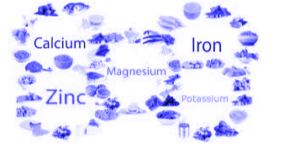Table of Contents
Important Topic Of Biology: Essential Minerals
The body needs a lot of minerals; these are called essential minerals. Essential minerals are sometimes divided into major minerals (macrominerals) and trace minerals (microminerals). These two groups of minerals are equally important, but trace minerals are needed in smaller amounts than larger minerals. The amount needed by the body is not an indication of its value. A nutritious diet usually provides all the essential minerals. The two tables below list the minerals, their functions in the body (their functions), and their sources of food.

Definition:
Minerals, in the end, come from the earth. They are inanimate objects found in the ground and in motion. We as humans cannot build minerals internally, so they are found in food. The body needs a lot of minerals commonly known as basic minerals. A basic mineral is one of the time divided into essential minerals called macrominerals and trace minerals referred to as microminerals. These two circles are equally important, however, trace mineral is required in smaller amounts than essential. In any case, keep in mind that the amount needed by the body is not necessarily a factor. A healthy diet should provide the human body with all the essential minerals because they are the basic nutrients the body needs to endure and complete daily activities and processes. You can get minerals by eating plants that pull them off the ground and by eating the flesh of creatures, which affect plants. Different types of complete minerals include calcium, sodium, and potassium. Examples of minor minerals are iron, fluoride, and iodine. In this article, we will learn about minerals, minerals in food, mineral functions in the body, mineral structures, and learn about important minerals in detail.
Properties of Minerals in Biology
The role of minerals is different. Minerals act as cofactors in chemical reactions as proteins cannot function without minerals and all cells except catalysts to function. Minerals likewise give us our value or, as it were, can be compared to a battery that keeps us charged. They are known to maintain a pH balance within the body. In addition, they promote the exchange of nutrients in all cell membranes and maintain the proper sensory processing. Not only this, they also help to weaken and loosen the muscles while at the same time helping to regulate the development of our body tissues as well as providing useful and effective body support.
Functions of Minerals
Minerals have many different functions in the human body. Let’s take a look at what the function of minerals is in our bodies.
Trace minerals are remembered for providing the aforementioned benefits, the case for which is mineral iron. Iron is found in the blood and is essential for the production of a protein called hemoglobin, which is found in red platelets, which transmit oxygen. From now on iron deficiency can lead to illness, which occurs when your body does not have strong red platelets. To maintain a precise distance from this, red meat with a lot of iron resources or if not use a grain-wrapped grain. Besides iron, another important trace mineral is fluoride. This is found in toothpaste and drinking water to make sure you do not get holes. Therefore, iodine is also added to track values in daily life on iodized salt. Iodine helps regulate digestion because it is important for the thyroid gland to build up its hormones. In line with these lines, large amounts and micronutrients have the same value despite the fact that micronutrients exist only in small amounts.
Importance of Minerals
Now let’s look at the importance of minerals in the human body.
Minerals are inanimate substances that the body needs in limited amounts for a variety of functions. These include orthopaedic and dental hygiene; such as basic fluids and body tissues; as components of chemical structures and general sensory function.
A few minerals are needed in larger amounts, for example, calcium, phosphorus, magnesium, sodium, potassium, and chloride. Some are needed in small quantities and are now frequently named for minerals, for example, iron, zinc, iodine, fluoride, selenium, and copper. Although required in small quantities, trace minerals are less important than different minerals.
Minerals are always stored more efficiently by the body whenever they are given to food as opposed to supplements. In addition, the diet low in certain minerals may be low in others, so the first step in controlling this is to evaluate and improve the overall diet. Eating a modified diet will help ensure the availability of more minerals in healthy people.
Also read: Important Topic of Biology: Deficiency Symptoms
FAQs
Q. What is the Definition of Minerals in Biology?
Ans: The minerals definition of biology is given as follows:
Minerals in food are the components present in food that are required by our body to create and function appropriately. From the above definition, we can reason that minerals are inorganic substances required by the human body to function effectively. The human body requires differing amounts of minerals day by day so as to fabricate solid bones and muscles. It additionally assists with keeping up different substantial functions. In this manner, we acquire these nutrients from eating foods rich in minerals.
Q. What is the Effect of Excess Mineral Consumption?
Ans: A lot of anything is risky. So also, the abundance of minerals may prompt certain illnesses in the body.
- An excessive amount of calcium in our diet may cause constipation and kidney issues.
- An overabundance of zinc admission causes loose bowels, heart issues, kidney malfunctioning, spewing.
- An excess of sodium in platelets expands the danger of stroke, other heart-related disorders, and Hypernatremia.
- An overabundance of iron can bring about cardiovascular issues, liver sickness, loss of enthusiasm for sex, infertility, and weakness.
A reasonable diet prevents mineral deficiencies. The utilization of nutrient and mineral supplements ought to be disheartened to prevent any unfriendly impacts.





